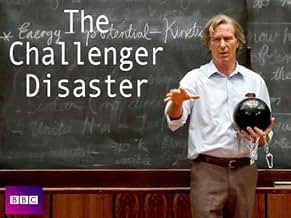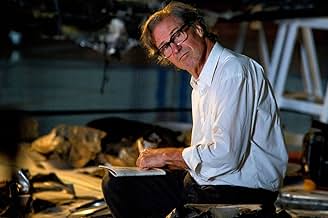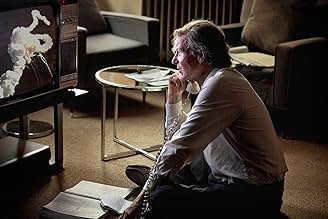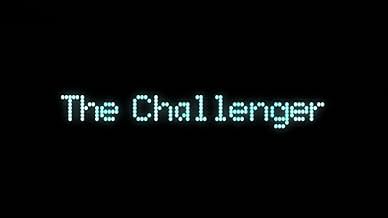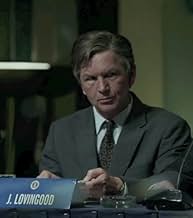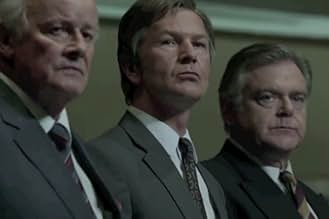Challenger - Ein Mann kämpft für die Wahrheit
Füge eine Handlung in deiner Sprache hinzuFactual drama exploring the truth behind the space shuttle Challenger's 1986 disintegration.Factual drama exploring the truth behind the space shuttle Challenger's 1986 disintegration.Factual drama exploring the truth behind the space shuttle Challenger's 1986 disintegration.
- Auszeichnungen
- 1 Gewinn & 2 Nominierungen insgesamt
- Michelle Feynman
- (as Megan Young)
- Judson Lovingood
- (as Sean C. Michael)
Empfohlene Bewertungen
The Challenger (formerly titled Feynman and the Challenger) is a made for TV movie which first aired on the BBC on March 18th 2013. The film focuses on the role Richard Feynman (William Hurt) played in the Commission and the lengths that he went to; to prove what was really behind the Shuttle's failure that January morning. The film intersperses real footage, including that of the actual event with dramatisations of Feynman's quest for answers which are taken from Feynman's autobiographical book What Do You Care What Other People Think? The movie is well researched and generally very well made and features a terrific central performance and compelling story.
I was born just under a month after the Challenger disaster but it was a part of my childhood. My parents had a huge poster on the stairs of one of the houses I grew up in of the crew and the Shuttle which used to intrigue and haunt me. As I got older I became very interested in Space exploration and in my twenties threw off the horrors of High School Physics lessons to become interested in physics. I am to physics what a football fan is to football. I'm fascinated by it and get engrossed in small details but put me on the field and I'd lose the ball faster than the speed of light. I am an enthusiastic amateur. All of the above is a very long and drawn out way of saying that the plot of The Challenger is of great interest to me. Its principle character Richard Feynman is a man who I have some but not much knowledge of and most of my knowledge comes from the odd popular science book, YouTube clips and occasional popular science lecture delivered by the likes of Prof. Brian Cox, Simon Singh and Ben Goldacre as well as the comedy of Robin Ince. I was fascinated then to learn more.
The film introduced me to a Feynman I wasn't expecting to meet. The Feynman I've seen footage of was controlled and firm and had a distinguishable but refined Queens accent. William Hurt's Feynman is much more 'Californian'. His accent is slightly different and his portrayal is more agitated and messy. I don't mean any of this in a bad way though and think it matches the state that the man was in both mentally and physically. Although slightly dishevelled, Hurt has more than a passing resemblance to the scientist he is portraying. What is obvious from the film is that the budget doesn't match that of an average theatrical film. There are corners cut in various places which sometimes detracts slightly from the movie as a whole but luckily the story is strong enough that it rarely gets in the way.
The plot is deeply fascinating and encompasses physics, ethics, finance and politics. All four combine in a tense and agitated melting pot which forms the Commission and it soon becomes apparent that Feynman is coming at the case from a different angle to the majority of the Commissioners. Early on he is frustrated by a lack of pace in the meetings and then he is stifled by the rigours step by step process. Feynman takes it upon himself to dig around and visits various NASA facilities in which he is viewed with suspicion by scientists and technicians scared to be held accountable. This sets up more conflict in the Commission and Feynman finds himself short of allies. He does however find a friend in Air force General Kutyna (Bruce Greenwood) who, like the audience by now, is sympathetic to the Physicist's cause. What follows is a slow unravelling of the facts which without Feynman may never have come to light.
The film treads a thin line between telling the truth and attacking the likes of NASA and Solid Rocket manufacturer Morton Thiokol much as Feynman did himself. Although my limited knowledge gave me some insight into the disaster and subsequent findings I was fascinated to be taken on the journey towards the discovery and felt that the film blended this with Feynman's health issues very well. It was clear from the outset that this was about Challenger first and his health second, something which again mirrors Feynman himself. Even the title of the movie can refer to the craft and the man. Occasionally I found myself questioning cover-ups and discoveries which seemed a little too dramatic and possibly exaggerated but my knowledge doesn't extend far enough to know what was real and what was invented. It is my belief and hope though that the vast majority of what I saw on screen was real. The actual footage certainly was and despite having seen it numerous times, it's still heartbreakingly sad.
Overall The Challenger manages to get to the heart of the disaster and uncovers a man who deserves to be better known than he is. William Hurt is superb and the plot is fascinating in every detail. I had a few problems with realism and dramatic licence and the budget caused some issues but overall I'd recommend the movie to anyone with a passing interest in NASA, the disaster, Richard Feynman or just good detective thrillers. Like most good true stories it made me want to learn more for myself which on its own proves the movie was a success.
www.attheback.blogspot.com
William Hurt is exceptional as physicist Richard Feynman, a member of the fact-finding commission, who almost single-handedly recognized the cause of the disaster and pushed the commission in the right direction. I did find his failing health issues to be important but overdone. The "peeing blood" and dialysis tended to take me out of the story when I'd already gotten and understood his health problems with the "x-ray" scene.
Brian Dennehy also did a remarkable job of channeling William Rogers (as head of the Challenger fact-finding commission) who from the beginning wants to whitewash the whole the thing. Rogers was the Secretary of State under Richard Nixon which is hardly a vote of confidence for the man and any real neutrality.
Overall, it would seem that history is not going to be kind to the Reagan Administration. The film does bring out facts that were never a part of any official commission findings implying those were repressed for apparently legitimate national security issues of the time. In a nutshell, the Reagan budget cuts caused NASA to promise the military the ability to launch military spy satellites via the shuttles almost on demand instead of the military developing their own new missile. Decidedly, putting temperature restrictions on such shuttle launches would not be something to tell the Soviets about. However, maybe in future years someone will realize that even this was a false concern because the launches would have been from the California coast where freezing temperatures would be almost non-existent.
I highly recommend this film to relive this piece of recent history.
Three agencies were involved in deciding to launch that freezing morning -- NASA, Raytheon, and Morton-Thiokol. This isn't made clear in the film, because the film is about Richard Feynman. But a New Yorker feature article years ago described what the agencies did about their doubts. Calls were made back and forth between the experts at each agency, each anxious to "check its six o'clock", and the question being asked gradually underwent evolution -- from "Should we launch?" to "Why SHOULDN'T we launch?" The results were disastrous.
A committee was formed to investigate the causes of the failure, with Feynman being the only independent members, all the others tied up with the military or with political considerations. But this isn't one of those dumb and oversimplified stories in which there is some sort of military/industrial conspiracy against the whistleblower. It belongs to the genre but is a pretty good example of it. So was the more commercially oriented "The Pentagon Wars." An example of a dumbed-down rendition is "The Insider," which really has little to say and shamelessly invents incidents to hype the drama.
William Hurt captures Feynman's personality with accuracy. Not his speech or his gestures. It's not an impression. But he has a grasp on Feyman's inner character -- devoted to science and outspoken. Feynman was actually quite a guy and might be described as abrasive. He didn't hesitate to demolish the ideas of others, whether they were equals or subordinates. He didn't do it viciously. He simply pointed out how stupid the notions were and then went on about his business.
The climactic scene is unforgettable. All the engineers (who generally hate physicists for having their heads in the clouds) are testifying before the committee and throwing up a blizzard of jargon about "ambient temperatures" and "Kelvin coefficients" and directions to "the Wheatstone Bridge" and other unfathomable cant in order to keep the water so murky that no one can detect their own part in the catastrophe. I won't give away the climax except to say that Feynman pulls a "Bill Nye, The Science Guy" stunt that shuts all the connivers up and embarrasses the experts.
The BBC put this out. I suppose they could afford to be a little less careful with American political sensibilities. William Hurt and his scowl of amazement is about perfect. Feynman's illness isn't dwelt on for sympathetic effect but it was real enough; he died a short time later.
Feynman was the critical independent factor which foiled such attempts when the Challenger exploded during take off in January 1986.
This factual account reveals Feynman was by chance adopted onto the investigative commission over the Challenger disaster at a time when he was critically ill. Unlike the rest of the commission members who had other agendas, Feynman approached the problem objectively and, through his popular demonstrations of physics for which he'd become famous, had the skill and passionate commitment to reveal the truth to the public. As he wrote in his report, 'For a successful technology, reality must take precedence over public relations, for nature cannot be fooled' Throughout this gripping drama you are taking the part of the underdog, frustrated at the increasing knowledge that the commission members, bar one or two, were driven by political agendas which meant the truth was trying to be covered up. Feynman represents the common man, and as such makes you part of the battle to foil the exasperating corruption.
William Hurt is magnificent playing Feynman, depicting non-conformist behaviour which is only tolerated because of his brilliance. I found his nuances of expression fascinating and wonderfully representative of how we, the public, would have reacted when faced with pompous authority attempting to control our behaviour. Brilliant stuff, and all the more telling because it is true.
Joanne Whalley is supportive as his wife, but the story is very much that of theoretical physicist Richard Feynman.
Bruce Greenwood is a vital link in the whole drama. He deserves a lot of credit for his strong portrayal of General Kutyna a disciplined loyal military man who acts as the catalyst for the truth to prevail. Greenwood looks like he was born in a uniform. He assumes the role as naturally as if he'd taken leave from the battlefield to make the movie.
Eve Best provides a solid and sensitive performance as Sally Ride (First woman in space). Her role in the Rogers Commission remains a mystery and we only learn of it just before the credits roll.
Brian Dennehy as William P. Rogers (Chairman and, former secretary of state) exudes the physical appearance of a persuasive man who has his own agenda and delivers a powerful performance. Dennehy is a master at conveying meaning in a story merely through the raising of an eyebrow, a glint in his eye or a subtle shift of body position.
One needs to make special mention of the good performance by many of the South Africans who were used in supporting roles. In particular Robert Hobbs who plays Allan J Macdonald a man torn between doing what is right whilst realizing the personal cost that might result.
There is no mention of the members who made up the "Rogers Commission". (Not even in the credits). The commission was comprised of some of the most influential members of the military and should surely be identified.
James Hawes directs with firmness and allows the story to flow and develop with fascinating insights into Feynman the scientist, but also Feynman the man and husband who had to fight his own person battles as a subplot.
Lukas Strebel camera shots are interesting. I feel the use of camera positioning where half the frame is blocked was at first novel, but maybe repeated too often and in some scenes it would have been better to allow the subject to take up the full frame.
The ending comes suddenly almost as if the editor had to condense the material into exactly 90 TV minutes. It is rumored that there might be a movie release where the running time will increase to 120 minutes. The Challenger is scheduled for the Discovery channel in the USA in November. Most probably renamed "73" – (Challenger broke apart 73 seconds into its flight).
Wusstest du schon
- WissenswertesWhen Feynman is talking to Bill Graham from his home office, you can see a California vanity plate that partially spells out "TOUVA" on a shelf. Feynman and his friend Ralph Leighton, who transcribed his adventures into the books "Surely You're Joking" and "What Do You Care What Other People Think?" had been on a quest to visit the remote Asian country of Tuva, a country all but inaccessible to Westerners in the late 1980s. Leighton obtained the plate for his car. Sadly, their last, best scheme to reach Tuva fell into place two weeks after Feynman died of stomach cancer.
- PatzerWhen Feynman visits the Shuttle factory, the flight deck interior is clearly that of a Boeing 747-200. You can see the flight engineer's panel and the four throttles on the centre console, also the windscreen layout gives it away.
- Zitate
Rogers: The other commissioners are just being respectful.
Richard Feynman: And you're saying I'm not? You understand the implications of the oxygen being activated? I do. The astronauts had to do that themselves. Which means they were ALIVE for at least some of those two minutes and thirty six seconds before they slammed into the ocean. Mr Rogers I'm an atheist, I personally doubt they're touching the face of God so I prefer to show my respect by finding the CAUSE of their appalling deaths and not stand around looking sad.
- VerbindungenFollows Challenger (1990)

